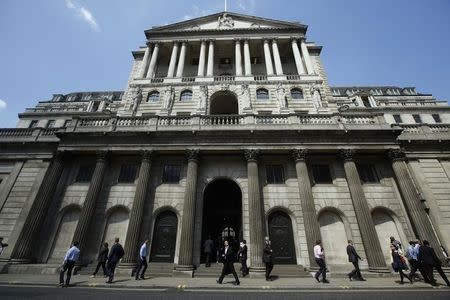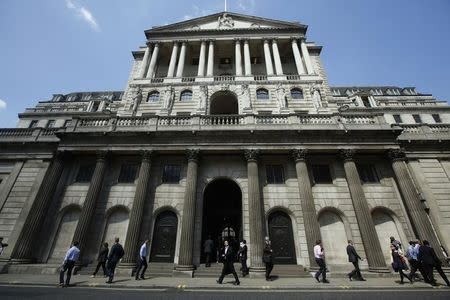Bank of England's Weale - Jobless fall still best guide to wage pressure
By William Schomberg
HULL England (Reuters) - The Bank of England should pay heed to the swift pace at which Britain's unemployment rate is falling as it considers when to start raising interest rates, says a top policymaker at the central bank who has already voted for rate hikes.
Martin Weale also said the BoE should not take too much comfort from a sharp fall in British inflation because it had been "significantly depressed" by sterling's appreciation and by falling oil and commodity prices around the world, something the central bank would look into next month.
However, he did say that he would continue to take the economic outlook for the euro zone and the global economy into account when he voted on rates.
European shares slumped on Wednesday as some investors feared the bloc could be returning to the crisis conditions of two years ago as growth slows.
Weale and Ian McCafferty are the two members of the Bank's nine-strong Monetary Policy Committee who voted in favour of an increase in the Bank Rate in August and September.
They argued that it was time to start raising borrowing costs in anticipation of a pick-up in inflation, as Britain’s economy was growing quickly.
Data on Wednesday showed Britain's unemployment rate fell more sharply than expected in the three months to August, to 6.0 percent, its lowest level in nearly six years and down from 7.7 percent a year earlier.
However, a combination of weak growth in wages, low inflation and the increasing risk of a recession in the euro zone have caused financial markets to all but rule out a rate rise this year.
Weale, in a lecture at the University of Hull in northeast England, struck a contrasting note as he explained why he was voting for rate hikes now.
He said the big degree of uncertainty among policymakers about how much spare capacity remains in Britain's economy meant the pace at which unemployment was falling probably represented the best indicator of wage prospects in the second half of 2015.
"I think it may be sensible for policymakers to give some attention to the rate at which spare capacity is being used up, and not to focus solely on estimates of the amount of spare capacity," Weale said in the lecture.
"My own sense is that the margin of spare capacity is now small and it is currently being used up rapidly," he said.
Slow growth in Britain's official measure of earnings might reflect how people getting jobs now had probably spent less time in education than a few years ago, when work was more scarce, depressing the current rate of average pay growth, he said.
"That is not to say that I think underlying pay is already growing faster than is compatible with the inflation target," Weale said. "Rather it is that the tightening of the labour market means that, instead of waiting to see wage growth pick up, I think it is appropriate to anticipate that wage growth."
By not raising rates now, steeper increases in borrowing costs might be needed in the future, he warned.
Weale also cautioned against being too relaxed about the sharp fall in British inflation.
"My sense is that the current inflation rate has been significantly depressed by the recent rise of the exchange rate and falling commodity prices," he said.
Inflation in Britain fell to 1.2 percent in September, its lowest level in five years, helped by the rise in the value of the pound, which makes imports cheaper, and falling oil and food prices.
Weale suggested policymakers should "look through" those effects pushing down inflation, just as the BoE did when a sharp fall in the pound after the financial crisis contributed to a surge in inflation to more than 5 percent in September 2011.
However, if inflation fell to very low levels, the BoE might have to "look through price changes less than fully on the downside".
He said the Bank of England would look into those effects when it draws up its next quarterly economic forecasts, due to be published in November.
Another member of the MPC, Kristin Forbes, also recently spoke about the impact of sterling’s strength on inflation.
(Editing by Susan Fenton)




